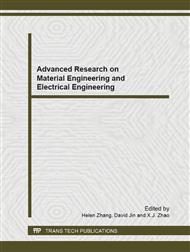p.218
p.222
p.227
p.231
p.235
p.242
p.246
p.251
p.255
Study on Power Delivering in Energy Management for Hybrid Electric Vehicle
Abstract:
The equivalent consumption minimization strategy (ECMS) is a method to reduce the global minimization problem to an instantaneous minimization problem to be solved at each instant. The adaptive ECMS is a development of ECMS in which the equivalence factors are not pre-coded, but rather calculated online. The equivalence factors, their optimal value, which minimizes the cost function while maintaining the vehicle substantially charge sustaining, depends on the specific driving cycle. The method proposed in this paper is one of the most important simplifications for actual real time implementation of A-ECMS and power delivering in energy management for HEV. The charging factor can be calculated if the discharging factor is calculated in the experiment for real time. And only a subset of (charging and discharging factors) generates a trend close to zero which indicates charge-sustainability.
Info:
Periodical:
Pages:
235-241
DOI:
Citation:
Online since:
March 2013
Authors:
Price:
Сopyright:
© 2013 Trans Tech Publications Ltd. All Rights Reserved
Share:
Citation:


